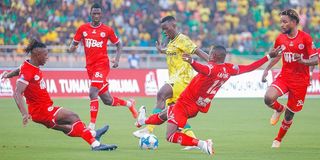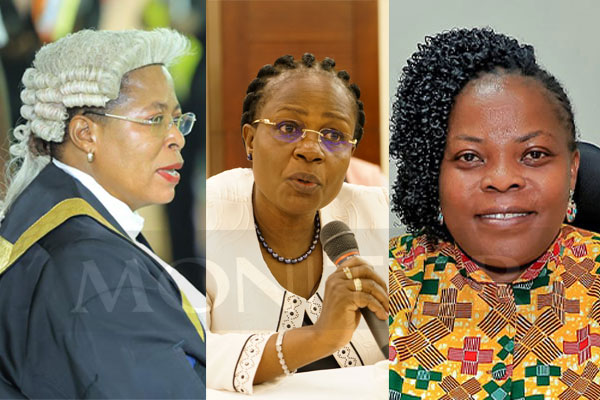Prime
Tanzania's iconic derby: The Yanga vs. Simba rivalry unpacked (1)

Dar es Salaam. On Saturday, April 20, 2024, the traditional rivals of Tanzanian football, Yanga and Simba, will meet in the continuation of the premier league for the 2023/24 season.
These rivals are meeting for the first time since Yanga humiliated Simba with a 5-1 thrashing on November 5, 2023.
In their history, these giants of Tanzanian football have met many times and drawn numerous matches, but heavy defeats like the one on November 5 are rare as seen below:
Yanga 5-0 Simba (Sunderland) - 1968
Simba 6-0 Yanga - 1977
Simba 4-1 Yanga - 1994
Simba 5-0 Yanga - 2012
Yanga 5-1 Simba - 2024
Missing in action
A match was scheduled to take place on March 3, 1969. Being the first match since Simba, then called Sunderland, suffered a 5-0 defeat to Yanga on June 1, 1968, many expected Simba to seek revenge for the humiliation they experienced in the previous match, but it wasn't to be... Simba went missing in action, and Yanga secured a victory by default.
What happened?
This is one of those matches that reminds us of how chaotic our football was back in those years. In 1969, our league, then called the National Champions Club, had many incidents.
Simba played against African Sports from Tanga and drew 1-1 in one of the early season matches. Later, it was discovered that Sports, who were one of the big teams in the country at the time, fielded a goalkeeper from the Ujamaa team in Tanga, which also participated in the league.
Simba appealed to the FAT (Football Association of Tanzania), seeking to be awarded the victory due to this error. However, Sports didn't hastily field the goalkeeper, as they had sought permission from FAT to do so, and it was granted.
The reason for seeking permission was the challenges they faced. Their first-choice goalkeeper was with the national team, and the second-choice goalkeeper had eye problems. Nevertheless, FAT allowed them to use another goalkeeper without asking for his name or where he came from.
Later, FAT admitted its mistake in allowing Sports to field a goalkeeper without proper verification. This, along with other administrative errors, prompted the government to dissolve FAT's entire leadership, forming an interim committee to oversee football affairs.
Simba demanded to be awarded the victory in the match against Sports due to the goalkeeper's ineligibility. They even declared that they wouldn't participate in the derby scheduled for March 3, 1969, unless granted the win.
Upon the interim committee's establishment, Simba was refunded the money paid for the appeal. There was hope that they might be granted the victory they sought. However, the committee found no sufficient evidence to support Simba's claim of being adversely affected by the goalkeeper's participation.
True to their word, Simba boycotted the match against Yanga on March 3, 1969. Consequently, the interim FAT committee awarded Yanga a victory by default and fined Simba Sh500 (five hundred shillings). The timely payment of the fine was mandatory, or else Simba risked being excluded from the league.
The situation demanded mature deliberations. Simba's fine was eventually lifted, allowing them to continue in the league. However, they were not granted the victory they had hoped for against Sports.
Thus, in the first season following that defeat, Simba's aspirations remained unfulfilled.
They were supposed to meet again in another season, 1970, but it passed without any games being played because the league was not held.
The reason for the league not being held was a conflict arising from changes in the league's management brought about by the FAT. For many years, since its inception in 1965, the league was dominated by neighborhood teams. However, in 1970, FAT opened the doors for many institutional teams to participate in the league. This is when teams like Ngome for Tanzania People’s Defence Forces (TPDF), Police, Prisons and Cargo among others got the chance to participate in the league.
The arrival of these teams led neighborhood teams like Simba, Yanga, and Cosmopolitan to lose players because their players were mostly employed in these institutions, especially Cargo, a port cargo company. Now they were required to play for their workplace teams.
Neighborhood teams refused to participate in the league. Additionally, the playing system was very complicated. With good intentions, FAT wanted the league to be played nationwide, but this was not feasible due to infrastructure limitations.
When it was time to submit the Tanzanian Champion to participate in the next African Champions Club Cup, the league had not even reached halfway... FAT decided to dissolve it and send Yanga's name to CAF as new representatives in the Champions Club Cup. FAT did this because Yanga were champions in 1969, so they let them continue participating in Africa.
So, the 1970 season passed without the rivals meeting, just like in the 1969 season. This means that since they last met on June 1, 1968, the rivals didn't meet again for two seasons.
The next season of 1971 came with hopes of the rivals meeting again. At that time, the league started at the regional level, and those who qualified went on to participate in the national league... where the champion was determined.
Yanga and Simba met in the competition for the Coastal region championship, with Yanga winning 2-0. At that time, Dar es Salaam was part of the Coastal region. This became the first match between the rivals since 1968, although it didn't carry the same prestige as matches for the national championship.
Unfortunately, they didn't meet again in the national league due to the same administrative issues. After the regional league was completed, the national league started, and teams played several games. FAT intervened and said that Dar es Salaam teams should play among themselves first. These teams were Simba, Yanga, Cosmopolitan, and Tambaza. These were the strongest teams in Dar es Salaam at that time. Simba refused this order, saying it would disrupt the well-progressing league... and they withdrew from the league.
This is why the rivals didn't meet nationally again since 1968. The national league match took place on June 18, 1974, in the semifinals of the national league. However, this match was interrupted in the second half with Yanga leading 1-0 with a goal by Leonard Chitete. The reason for the interruption was violence caused by Simba player, Emmanuel Mbele "Dubwi", who attacked Gibson Sembuli of Yanga. Mbele had previously caused a match to be interrupted in 1968, leading to a replay on June 1, where Yanga won 5-0. After Mbele's attack on Sembuli, violence erupted between players on the field, and the police invaded the field, ending the match.
Yanga were awarded a table victory because Simba caused the violence. The first national match that concluded was held on June 23, 1973, in the semifinal match of the national league. This match took place at the national stadium (now Uhuru) with Simba winning 1-0, with a goal by captain Haidar Abeid in the 68th minute.
In simple terms, since June 1, 1968, the traditional rivals didn't meet in an official league until June 23, 1973... five years later!
To be continued…..





